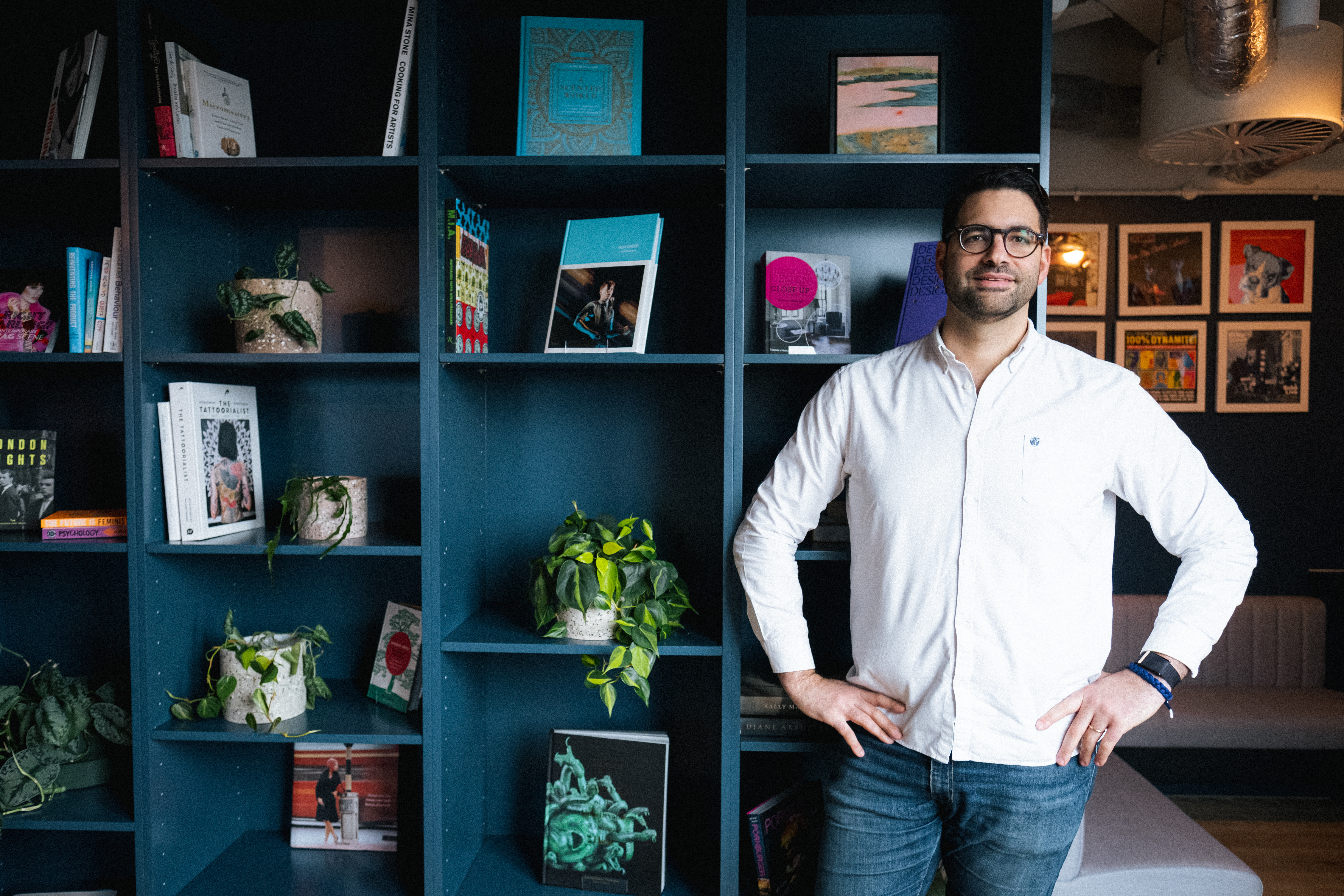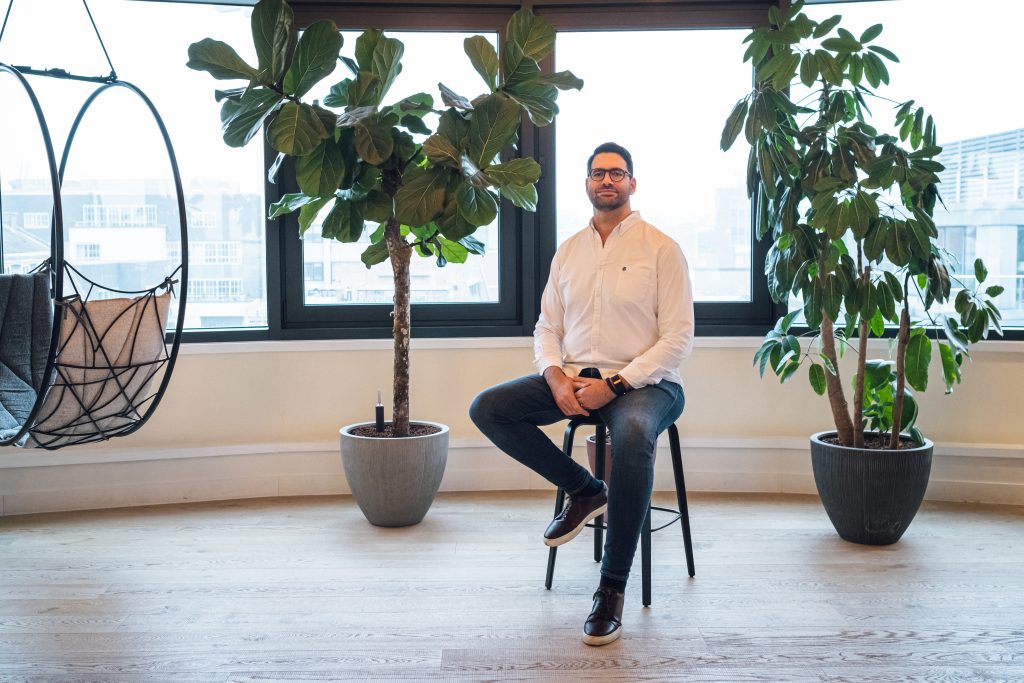Entrepreneur of the week : Ramzi Rafih (H.09) supports immigrant-led start-ups

Based in London, the Lebanese investor Ramzi Rafih (H.09) marked 2023 by creating No Label Ventures, an early stage investment fund focusing on supporting immigrant entrepreneurs. An initiative intertwined with his personal journey.
Ramzi Rafih’s journey is a history of crises and fresh starts. Born in the midst of a civil war, this Lebanese native spent his childhood between his home country and Saudi Arabia. When he returned to Lebanon in the 1990s, it was a time of post-war hopes he qualifies as “beautiful years.” Ramzi naturally joined the protests when the Cedar Revolution, a peaceful movement against the Syrian occupation, unfolded. “I was part of that group of students who rebelled during the uprisings,” he says.
However, in the summer of 2006, the war between Hezbollah and Israel erupted, prompting the future entrepreneur to pursue his studies in France. “At that moment, I realized the hope I had for Lebanon wouldn’t materialize due to geopolitical reasons and, more generally, because of economic problems and corruption. As much as I love my country and want to contribute to my homeland, it’s hard to envision a future there.”
Admitted after a round of remote interviews, Ramzi enrolled in the Grande École program at HEC after earning his degree in mechanical engineering from the American University of Beirut. “It was surreal to transition from a Lebanese context of war in bustling Beirut to a very peaceful, quiet campus. The years I spent there were some of the best.”
On campus, he found himself more interested in human relationships and the social aspect of business more than in numbers alone. “Getting a degree at HEC would allow me to complement the analytical aspect I developed as an engineer with something that motivated me more.”
The explosion in the port of Beirut was a very important point of reflection for me.
Beginnings at the heart of a financial meltdown
He completed an internship at JP Morgan in London amidst the major financial crash of 2008. “I got a glimpse of the golden years of investment banking,” Ramzi Rafih recalls. “That’s when I decided that investment was what I wanted to do. But quickly, I think everyone began to realize things were going downhill. Our cohort of interns was one of the last to receive an offer.” He officially began his career in mergers and acquisitions with the American multinational the following year. “I believe living through that period always prepared me, now I always keep in mind that good times don’t last,” he adds.
After a stint at the firm Silver Lake, he then led the European fintech activities for the American fund KKR. “Investment is fascinating. It’s one of the few jobs where you make decisions and immediately face the consequences of those decisions, whether positive or negative. If you take it the right way, you can grow and improve. It is also a human job.”
“I didn’t want to have regrets”
Then, chaos struck his homeland again in August 2020. “The explosion in the port of Beirut was a very important point of reflection for me. I wanted to do something useful,” he explains. Also affected by the loss of a few loved ones, he decided to materialize an entrepreneurial and financial ambition. “Last year, I reached a point where I thought : if I don’t don’t this, I will regret it.”

In January 2023, he founded No Label Ventures: a seed-stage venture capital (VC) fund that aims to invest in startups with at least one immigrant non-European founder. “Any immigrant who is ambitious, willing to work hard, and wants to create something beautiful should have access to funding.”
This “motivation for impact” is drawn directly from his personal experience and startups must initiate projects in Europe to be supported by the fund. “I have only positive things to say about Europe, especially France and the United Kingdom because they are my adopted countries,” says Ramzi Rafih. “Ultimately, they do a very good job of allowing their best talents to flourish. They are democracies; they are free societies.”
The United States, where 55% of unicorns were formed by immigrants, are an inspiration for the entrepreneur. “This openness to others is very important. Immigrants can be and are job creators. They are also innovators.”
I’m very optimistic. I think we’ll have many more success stories of women entrepreneurs and immigrant entrepreneurs in the next years.
Since the creation of No Label Ventures, Ramzi Rafih has invested in eight young companies, despite an ecosystem currently facing financing difficulties after a historic boom in venture investing. “It’s a very particular year in the world of VC, or risk capital. A very tough year to raise funds,’’ he says. ‘’But supporting projects has been a huge personal reward.”
He mentions, among others, the startup Spore Bio. Co-founded by two Moroccan entrepreneurs and a Frenchman, it develops microbiological tests for agri-food industry giants, allowing the real-time detection of toxic pathogens in ingredients. Ramzi took a chance on Spore Bio before introducing the team to venture capital funds, leading to two serious offers.
35 start-ups in 2025
Guided Energy, co-founded by an Indian entrepreneur, is another a success story. “Initially, they struggled a lot to raise funds from French funds.” Language barrier, lack of contacts… Ramzi Rafih’s intervention, acting as a matchmaker in the tech ecosystem, made a difference: “They eventually raised around 5 million euros.”
His goal for 2025? Targeting €10-15 million of investment in 35 startups. “I’m very optimistic. I think we’ll have many more success stories of women entrepreneurs and immigrant entrepreneurs in the next 5, 10, 15 years.”
Published by Estel Plagué

